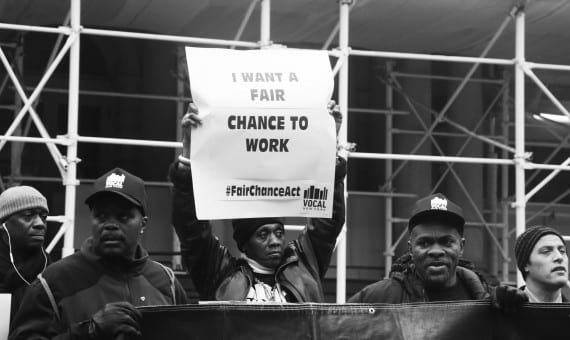ALBANY – On the morning of Thursday, July 28, Albany County Legislator Sam Fein (D-6), along with members of the legislature’s leadership and the majority-minority district caucus, introduced a new law intended to stop the county from discriminating against potential employees by asking about their criminal histories during the application process.
The “Albany County Fair Chance Act” seeks to prevent the county from inquiring about a job applicant’s criminal record through a question, interview, or box on the job application. The goal is to ensure all job candidates, regardless of their arrest record or criminal history, receive a fair chance of obtaining employment with the county, said Fein, who represents a majority-minority district at the South End of Albany.
“I constantly hear about the challenges that so many people face in finding employment because they are judged based on a mistake they made earlier in their lives, rather than their qualifications for a position,” Fein said, pointing out that minority communities are disproportionately affected due to higher overall rates of incarceration, a reality that he characterized as “fundamentally unfair.”
 “I am proud to propose legislation that will ‘ban the box’ on all Albany County job applications,” he said, hoping that Albany county will become one of more than 100 municipalities nationwide to impel employers to initially consider a job candidate’s qualifications without the stigma of a criminal record. Born of the “All of Us or None” initiative, these legislative endeavors are intended to provide applicants a fair chance by
“I am proud to propose legislation that will ‘ban the box’ on all Albany County job applications,” he said, hoping that Albany county will become one of more than 100 municipalities nationwide to impel employers to initially consider a job candidate’s qualifications without the stigma of a criminal record. Born of the “All of Us or None” initiative, these legislative endeavors are intended to provide applicants a fair chance by
removing the conviction history question on the job application and delaying the background check inquiry until later in the hiring. On the federal level, President Barack Obama has endorsed ban-the-box by directing federal agencies to delay inquiries into job applicants’ records until later in the hiring process. (Nine states—Connecticut, Hawaii, Illinois, Massachusetts, Minnesota, New Jersey, Oregon, Rhode Island, and Vermont—have removed the conviction history question on job applications for private employers as well.)
According to the proposed legislation, which says that studies have shown that stable employment is one of the best indicators of “post-conviction success,” legislators feel that, “the ability of people with a criminal history to successfully reintegrate into their communities and find employment improves public safety and benefits local taxpayers, as less crime leads to safer communities, strengthens families, and saves taxpayers money on costs associated with law enforcement and incarceration.”
Further, per the proposed local law (No. N, 2016), “those who have been incarcerated have paid their debt to society and should be considered fully free men and women. They should not be further punished…. people with a criminal history represent a workforce with skills and a desire to add value to their communities.”
Supporters of the legislation include: Chairman Sean Ward (D-16), Majority Leader Frank Commisso (D-11), Deputy Majority Leader Lucille McKnight (D-1), Merton Simpson (D-2), Wanda Willingham (D-3), Norma Chapman (D-4) and William Clay (D-12). Joining Fein in introducing the legislation were Commisso and Simpson, as well as: Alice Green, director of the Center for Law and Justice, former county legislator James H. Bouldin, Richard Harris, president of One Hundred Black Men, Tina Allen, secretary of Anuanzeh Association of United Women of the Capital District, and Shataya Scott, who operates Braids for Grades in downtown Albany.
“An increasing number of states and companies in the U.S. do not allow questions about criminal pasts on job applications,” said McKnight, “and I join with Sam Fein out of a sense of fairness in calling on Albany County to do the same.”
 State law prohibits discrimination in employment on the grounds of an arrest or a conviction, but it is very difficult to prove, according to Simpson, who said, “The Albany County Fair Chance Act would give employers the ability to make a decision on an applicant’s fitness for a job without the pernicious bias that comes with a criminal record.”
State law prohibits discrimination in employment on the grounds of an arrest or a conviction, but it is very difficult to prove, according to Simpson, who said, “The Albany County Fair Chance Act would give employers the ability to make a decision on an applicant’s fitness for a job without the pernicious bias that comes with a criminal record.”
“It’s important that we expand opportunities to people in our communities,” said Willingham. “Many people who have been previously incarcerated are working to make a better life for themselves and we need to give them a second chance.”
The Albany County measure would prevent county employers from inquiring about criminal histories during the initial stages of the hiring process. After a conditional offer of employment is made, the employer would then be able to conduct a background check—if an employer determines that an applicant’s conviction history may justify rescinding the offer of employment, the applicant would then be provided with an opportunity to respond to the employer’s concerns before the offer is officially rescinded.
“This issue is vitally important for any person that is trying rehabilitate their lives, but especially for African-Americans, who are incarcerated at much higher rates than others,” Chapman said.
“We must lead by example in creating fair-chance hiring practices that ensure everyone gets a fair chance at employment,” said Fein.
According to the National Employment Law Project (NELP), more than half the US population is now living in a ‘ban-the-box’ or “fair-chance” jurisdiction.
A fact sheet released by NELP in favor of banning the box can be found here: http://www.nelp.org/content/uploads/Ban-the-Box-Fair-Chance-Fact-Sheet.pdf



